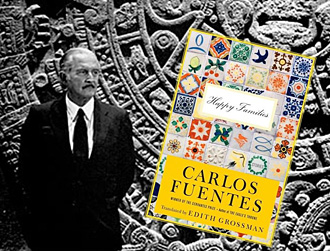
|  |  |  Entertainment | Books | November 2008 Entertainment | Books | November 2008  
Family Feuds & Other Tales of Domesticity
 Ed Hutmacher - MexicoBookClub.com Ed Hutmacher - MexicoBookClub.com


| | Happy Families by Carlos Fuentes — sixteen short stories by Mexico's premier man of letters, inspired by Tolstoy's famous comment on families — "Happy familes are all alike; every unhappy family is unhappy in its own way." MexicoBookClub.com | | |
One generally doesn't read a book by Carlos Fuentes to be entertained. His stream-of-consciousness style of writing, irregular punctuation and regular doses of emotional and philosophical prose is more dizzying than dazzling. But once the mechanics are mastered, Fuentes has much to say about things that matter to readers. Like family matters.

We are all part of a family, dysfunctional or not, and all of us can recount the agonies and ecstasies of domestic life. Few of us, however, can do so with such gritty ambiance as Carlos Fuentes.

His most recent book in English, Happy Families, is a collection of 16 short stories thematically strung together by Leo Tolstoy’s paradigmatic line from Anna Karenina, which reminds us that, "Happy families are all alike; every unhappy family is unhappy in its own way."

As you might guess, there aren’t many happy families in this book. Instead, we are presented with introspective tales of familial emotions that vacillate between loyalty and betrayal on the one hand and devotion and rebellion on the other.

Such weighty stuff might be a turnoff to prospective readers tempted to pass up the book, but that would be a mistake. Like all of Fuentes’ novels, there are valuable insights to be found in his multi-layered prose. What could easily be sensational telenovella fare for Telemundo becomes a series of meditations on the sometimes painful commitments we make to people by virtue of family ties.

All of the stories take place in Mexico, and Fuentes, who is acutely aware of the corruption, greed and opportunism that run rampant in his home country, rarely misses an opportunity to uncover some truths by obliquely connecting the dots.

"Being a man doesn’t mean not being a child anymore but beginning to be a criminal," says the narrator in The Mariachi’s Mother, which portrays a mother’s love for her son and desire for him to lead a better life than she. "I don’t recognize myself," whispers a wife to her husband after 33 years of marriage in A Family Like Any Other, a story of failed dreams and misunderstandings. "And what do you think is worse... rebellion or betrayal?" an army general asks his son in The Armed Family, a story that seeks to unravel paternal loyalties even as it tests one’s obligation to his country.

The collective tone of these stories should resonate with all of us—they are portraits of families struggling to communicate. The points of view shift among family members to reveal feelings of isolation and the difficulty of establishing a unique identity within the traditional family structure. The husband of a former bolero singer "cannot understand why she doesn’t accept the simple tranquility of her home." The children, too, feel the tension between the warmth and security the home provides and the desire to strike out on their own.

A similar battle pervades the presidential household in "The Official Family," in which the president seeks to tame his rebellious son. His status as leader of the nation makes this task all the more difficult, as he considers the Mexican people his "extended family." Attempting to find his own identity by acting out, the son loses the respect of his father, upsetting the delicate balance between public and private matters that the president strives so hard to achieve.

Fuentes also explores the layered psychology of romantic and sexual love, particularly in "The Gay Divorcée," a chronicle of the waxing and waning desires of an aging gay couple; "A Cousin Without Charm," which features the forbidden but seemingly inescapable love between cousins; "Sweethearts," a heartwarming reunion of long-ago lovers; and "Conjugal Ties," a shocking examination of the psycho-sexual relations between husbands, wives and their (sometimes multiple) extramarital partners.

What are we to make of this compendium of sketches of troubled domestic life in modern Mexico? For starters, consider the irony of the book’s title juxtaposed to Mexico’s own complicated quest for understanding, acceptance and identity — most all of the relationships are marred by forms of violence and betrayal that often descend into ugly, destructive power struggles between fathers and mothers, parents and children, husbands and wives. With such a rancorous inheritance, Fuentes may be hinting that there's no such thing as a happy family in the context of an imperfect social order. Perhaps it is the tradition of suffering that binds these unhinged families together.

What makes this book beguiling is my feeling that Fuentes is trying to probe deeper into this malaise. The Tolstoy epigraph admits, and Fuentes shows, many kinds of unhappiness. But it doesn't rule out happiness altogether. I think that Fuentes is asking whether these kinds of suffering are endemic, or whether they are the tragic consequences of modern life. Is it modern society that drives people to hurt each other? Or is it an inescapable fact of humanity? They are questions for the reader to ponder?

Ed Hutmacher is Editor in Chief of Mexico Book Club. For more information on this book or other books with Mexico-related themes, please visit the website at MexicoBookClub.com. |

 |
|  |



